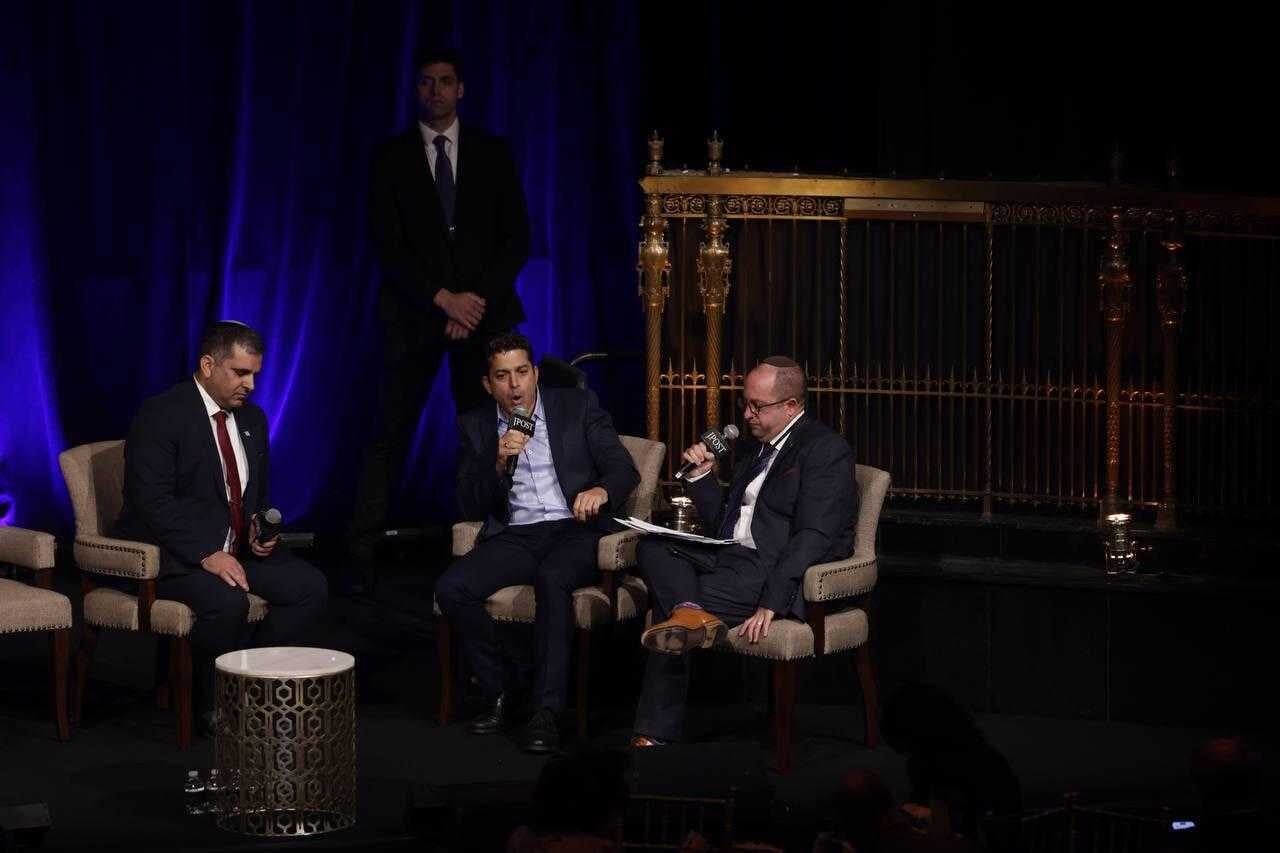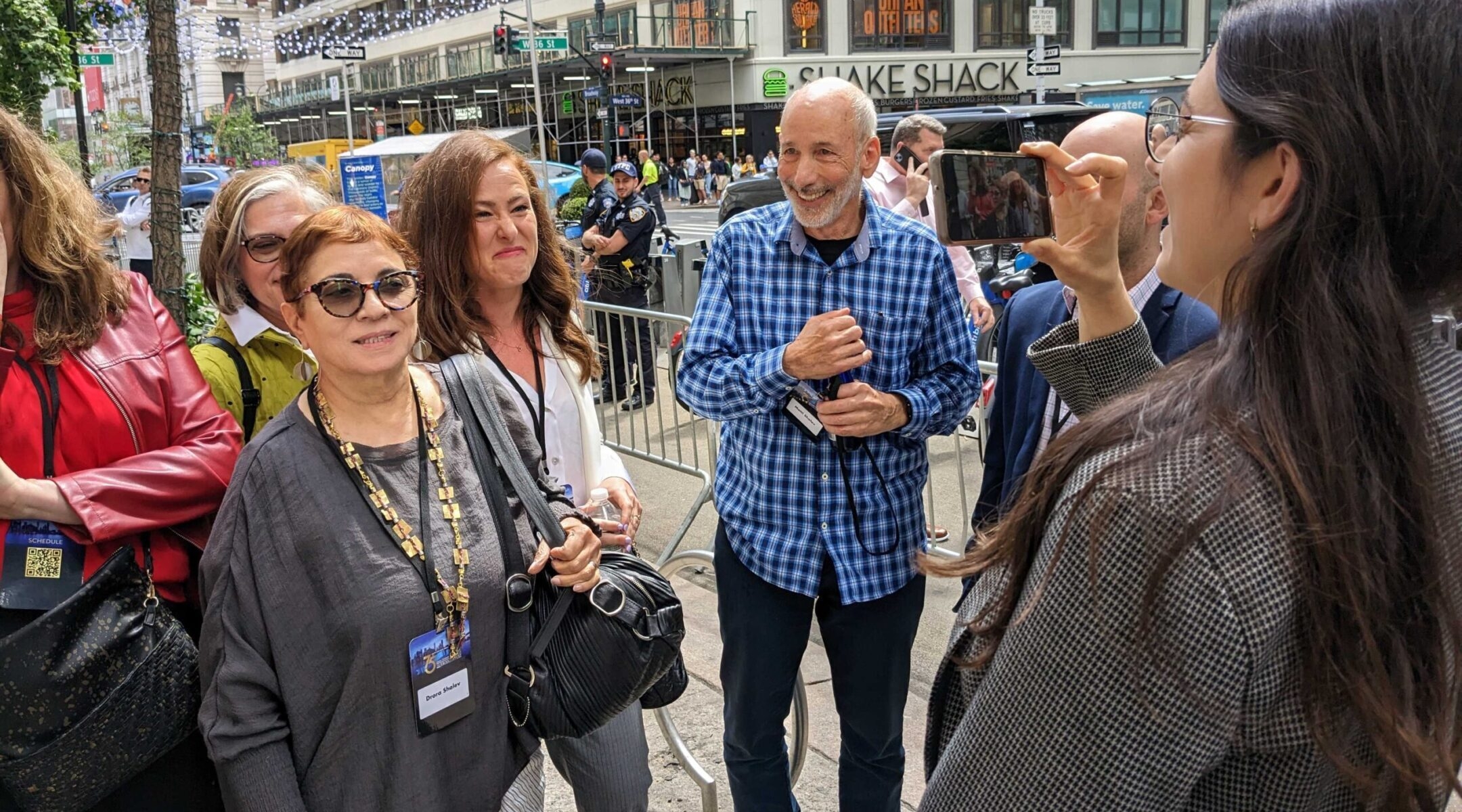(JTA) — Leading up to its New York City conference, the Jerusalem Post tried to avoid the anti-government protests that had bedeviled other recent gatherings where Israeli government officials had spoken.
And until 3 p.m., it appeared the Israeli newspaper’s efforts had succeeded.
Protest organizers told the Jewish Telegraphic Agency that the conference had canceled 20 to 30 tickets that protesters had bought. A demonstration outside the conference, which took place in Manhattan on Monday, had dissipated by mid-morning.
At one point, four security guards on the sidewalk manhandled a protester who tried and failed to enter the atrium. But inside, for most of the day, all passed quietly. Israeli right-wing government ministers who had been heckled at other events appeared onstage without interruption. The biggest distraction in the room was a constant hum of chatter among the attendees.
But in the mid-afternoon, as Israeli Economy Minister Nir Barkat took the stage to discuss government action to encourage entrepreneurship, the familiar Hebrew chants of “Shame! Shame!” echoed in the room, disrupting his remarks, and a group of protesters were escorted out.

Israeli Immigration and Absorption Minister Ofir Sofer (left) and Diaspora Affairs Minister Amichai Chikli (center) appear onstage at the Jerusalem Post Conference in New York City on June 5, 2023. (Marc Israel Sellem)
“What violence, what did we do?” said Shany Granot-Lubaton, a local protest organizer who was barred from entering. “Barkat can’t take it that we’re heckling him? We can heckle him. Keep talking, we’re all adults. We’re allowed to express our opinion.”
The ejection was a kind of coda to a week in which protesters in New York and elsewhere, many of them Israeli expatriates like Granot-Lubaton, have tried to meet and disrupt Israeli cabinet ministers wherever they were — at meetings with Jewish organizations, speaking in synagogues, at a parade on Sunday or walking on the public sidewalks. Videos of the disruptions circulated online. The ministers who were the targets of the protests decried being hounded, and the demonstrators said they were exercising their right to free speech.
In one instance in Los Angeles, in the face of the protesters, an Israeli cabinet member canceled a speech. On Friday night, a leading architect of the Israeli government’s effort to weaken the judiciary grabbed a protester’s megaphone in New York City and rushed away before handing it back.
On Sunday, Amichai Chikli, Israel’s minister of Diaspora affairs, was photographed making what looked like an obscene gesture while grinning at protesters at the Celebrate Israel Parade. He and a spokesperson insisted that he was telling the protesters to smile, but that only one finger was raised toward his mouth because he was clutching an Israeli flag with the others.
.@AmichaiChikli to the pro-democracy protesters across the barriers ⬇️ pic.twitter.com/g69jsXOf58
— Jacob N. Kornbluh (@jacobkornbluh) June 4, 2023
Speaking onstage on Monday, Chikli seemed to allude to the incident. “Amazing experience, good music, good vibes, and we made sure everyone smiled,” Chikli said about the parade.
The conference organized by the Jerusalem Post was intended to provide a substantive forum to discuss contemporary Israel as a complement to the celebratory parade. The Jerusalem Post, which is a syndication client of the Jewish Telegraphic Agency’s wire service, did not respond to a request for comment about its approach toward protesters.
Throughout the conference, the government’s judicial overhaul — which, if passed in its current form, would sap the Israeli Supreme Court of much of its power — was referenced throughout the conference but did not dominate the agenda. Speakers included Chikli, Barkat and a few other Israeli cabinet ministers; New York City Mayor Eric Adams; two senators: James Lankford, an Oklahoma Republican, and Ben Cardin, a Maryland Democrat; officials from the Biden administration; and an assortment of other public figures in Israeli politics, business and the nonprofit sector.
“Israel is an independent country, they make their own decisions,” Cardin, who recently announced his impending retirement, said in an interview on the conference sidelines. “There are policies that the current government are espousing that I think are wrong, and I’ll express myself, but it doesn’t at all affect my deep support for the special ties between our two countries and the continued U.S. support for Israel.”
But while the gathering didn’t center on the strife currently tearing apart Israeli society, speakers throughout the day stressed the need for pan-Israeli solidarity, at times coupled with criticism of the government. Ehud Olmert, the former Israeli prime minister who served a prison sentence for corruption, gave a fiery interview in which he said, to cheers, “If we do not understand that these ministers do not speak for the people of Israel and for the Jewish people, we will pay dearly.”
Benny Gantz, the centrist former defense minister and opposition politician, said that when it comes to Israel countering a military threat from Iran, “Should a time come when action is needed, this government will receive full support from the opposition in any determined, appropriate, and responsible action.”
But he added, regarding Israel’s domestic politics, “We need to shift power from the extremes to the center, and treat minorities decently.”
Israeli government officials focused their remarks on other topics. Chikli both praised and criticized the Biden administration’s recent plan to combat antisemitism, expressing gratitude that it referred to a definition of antisemitism whose provisions mostly focus on Israel, but lamenting that it referred to another definition as well.
“I think it is positive that there is a plan to combat antisemitism,” he said. “It is important that they say the most important and central definition. But it is bad that they opened the door for irrelevant definitions.”
And Chikli and Ofir Sofer, the minister of immigration and absorption, both suggested that the government should discuss amending the Law of Return, which affords automatic Israeli citizenship to any Jew or descendant of at least one Jewish grandparent.
“I don’t think it’s going to change in the near future,” Sofer said, adding that he would set up a committee to discuss the issue. “But I am going to deal with this issue. I will lead the dialogue between the Jewish community and the Israeli government and Israeli society.”
But standing outside after they were kicked out, the handful of protesters who were in the conference said their goal was to prevent the government officials from conducting business as usual.
The goal, said Matti Shalev, a protester, is “to make Nir Barkat aware that anywhere in the world he is going, we’re going to remind him that this will not come to pass.”
JTA has documented Jewish history in real-time for over a century. Keep our journalism strong by joining us in supporting independent, award-winning reporting.






